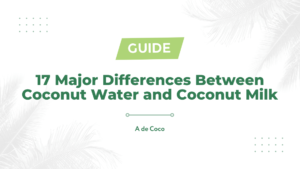Coconut water has been progressively growing in popularity as a natural energy drink due to its refreshing taste and many health benefits.
A rich source of electrolytes and a panacea for hydration, it is often touted as nature’s sports drink.
However, as with any superfood, the key question arises – how does daily consumption impact our health?
A thorough understanding of its nutritional content and potential health effects is essential.
This includes investigating both the positive outcomes and potential drawbacks.
Empowered with this knowledge, one can make an informed decision on whether to incorporate it into the daily diet.
Contents
- What Happens If You Drink Coconut Water Everyday?
- The Nutritional Breakdown of Coconut Water
- Can You Replace Water with Coconut Water?
- Benefits of Daily Coconut Water Consumption
- Risks and Precautions of Overconsuming Coconut Water
- How Does Daily Intake of Coconut Water Affect Skin?
- Will Every Day Coconut Water Intake Assist Weight Loss?
- The Bottom Line
What Happens If You Drink Coconut Water Everyday?
If you drink coconut water daily, it can have several health benefits primarily due to its high potassium content and natural electrolytes which aid hydration. It can help regulate blood pressure, support heart health, and improve digestion. However, depending on the brand, it could be very high in calories and sugar, so excessive consumption could lead to weight gain and increased blood sugar levels.
Beyond these primary health benefits and potential drawbacks, it’s worth delving a little deeper to fully understand the impacts and implications of daily coconut water consumption.
As we proceed, we’ll examine a breadth of lesser-known nuances tied to its consumption, including its effects on kidney health, workout recovery, and skin quality.
There’s also a wealth of knowledge to unpack regarding how individual nutritional needs and lifestyle factors can influence how your body reacts to this tropical beverage.
By diving into these areas, we hope to provide readers with a more comprehensive understanding of this popular health drink.
The Nutritional Breakdown of Coconut Water
Coconut water, a refreshing and nutritious drink, is sourced from young green coconuts and is rich in several important nutrients.
The primary nutrient in coconut water is none other than water, which makes up 95% of its composition.
This high water content, coupled with its natural flavors, makes it an excellent hydrating beverage.
Metabolic Nutrients
Coconut water is an excellent source of potassium, providing about 17% of the Recommended Daily Intake (RDI) per serving.
It also imparts critical electrolytes such as sodium and magnesium that are involved in many metabolic functions in the body.
People with active lifestyles would specifically find coconut water advantageous due to its significant electrolyte content, which can aid in rehydrating the body after physical exertion.
>”Coconut water is an excellent source of potassium, providing about 17% of the Recommended Daily Intake (RDI) per serving.”
This is a point to note as the efficient operation of the body’s metabolic processes often hinges on the availability of these electrolytes.
Coconut water’s rich mineral content also circumvents the need for synthetic sports drinks dealing with hydration after strenuous exercises.
Energy and Digestion
Besides its mineral content, coconut water also brings carbohydrates to your bodily system.
In fact, an average serving provides around 9gm of carbs.
These carbs are primarily sugars, with a small amount of dietary fiber.
However, unlike artificial drinks, the sugars in coconut water are natural and provide a healthier source of energy for the body.
>”These carbs are primarily sugars, with a small amount of dietary fiber.”
This carbohydrate content is another reason why active individuals find coconut water a great drink post-workout.
The natural sugars provide an immediate energy boost, while the dietary fibers assist in digestion and the maintenance of gut health.
Antioxidants and Other Nutrients
In addition to its metabolic and energy providing nutrients, coconut water also offers a variety of antioxidants, the molecules that neutralize harmful free radicals in our bodies.
Other important nutrients include Vitamin C, calcium, and a minor percentage of iron.
Collectively, these elements enhance the immune system, support bone health, and promote blood circulation.
>
The primary nutrient in coconut water is none other than water, which makes up 95% of its composition.
The presence of these essential nutrients means that along with hydration, consuming coconut water could have combative effects against oxidative stress and aging, while promoting overall health.
This video may provide additional insight into the potential health benefits of coconut water.
It further highlights the science-backed reasons for including this nutritious drink in your everyday diet.
Can You Replace Water with Coconut Water?
Water is a universally accepted fluid that accounts for majority of our body fluid and is essential for the majority of bodily functions.
As important as it is, can it be replaced with coconut water?
This topic has been an area of discussion, with people curious about its plausibility and the effects it would have on the body.
Coconut Water vs. Regular Water
Coconut water comes from young, green coconuts and it is high in electrolytes including potassium and manganese.
It contains less sugar compared to other fruit juices and beverages, and it hydrates the body just like regular water.
However, unlike plain water, coconut water isn’t calorie-free.
It does contain a significant amount of calories compared to plain water.
Hydration and Electrolytes Replenishment
People often use coconut water as a source of hydration after a heavy workout because it contains natural electrolytes.
The potassium in coconut water, in particular, helps in maintaining a healthy balance of electrolytes in the body and can support heart health.
The natural sugars in coconut water also make it a better choice for replenishment post-workout, compared to plain water.
That being said, whether or not it can entirely replace water in your diet is a question of quantity and balance.
Just like any other form of sugar, consuming coconut water in excess can affect your sugar levels, possibly leading to health complications.
Considerations for Dietary Changes
While coconut water is considered safe for most individuals, it is important to consider how it fits into an overall balanced diet.
It may not be suitable for those monitoring their sugar or calorie intake.
As with any dietary changes, it is always recommended to consult your health or nutritional professional to determine if replacing water with coconut water is a suitable strategy for your specific dietary goals and health condition.
In conclusion, while coconut water can’t completely replace regular water due to its sugar and calorie content, it does have beneficial properties that make it an attractive option for people trying to stay hydrated.
However, moderation is key and it’s always important to be mindful of the sugar content when creating your hydration plan.
Benefits of Daily Coconut Water Consumption
Coconut water has surged in popularity over the past few years, often touted as a ‘super drink’.
But, are these claims based on fact or fiction?
Let’s explore the key benefits associated with daily coconut water consumption.
Natural Hydration
Coconut water is a natural electrolyte beverage which helps in re-hydrating the body.
Being rich in potassium, sodium, and magnesium, it replenishes the minerals lost through physical exertion.
This makes it an excellent post-workout drink.
‘Being rich in potassium, sodium, and magnesium, coconut water replenishes the minerals lost through physical exertion.’
Sipping coconut water daily is a fantastic way to restore essential minerals in the body.
It also aids in increasing overall body fluid levels.
Good for Digestive Health
The presence of bioactive enzymes such as acid phosphatase, catalase, and dehydrogenase aids in boosting digestion and metabolism.
Regular consumption of coconut water helps in preventing indigestion and reduces the occurrence of acid reflux.
‘Regular consumption of coconut water helps in preventing indigestion and reduces the occurrence of acid reflux.’
Having a glass of coconut water daily can provide significant relief to people with stomach issues.
It also aids in boosting metabolism which is essential for maintaining optimal health.
Rich in Antioxidants
Coconut water also has high levels of antioxidants which help to neutralize oxidative stress and free radicals created by exercise.
These antioxidants in coconut water can help to reduce the risk of heart diseases and improve overall health.
‘These antioxidants in coconut water can help to reduce the risk of heart diseases and improve overall health.’
This natural beverage can be incorporated into your everyday diet to derive its maximum benefits.
It’s always better to go natural when it comes to health and wellness.
May Support Weight Loss
Coconut water is low in calories and is free of fat, which makes it an excellent choice for those trying to lose weight.
It’s extremely filling thus helping in the reduction of overeating and binge-eating sessions.
‘Coconut water is low in calories and is free of fat, which makes it an excellent choice for those trying to lose weight.’
Adding coconut water to your daily diet not only quenches your thirst but also satisfies hunger pangs.
It’s a healthful alternative to high-caloric drinks.
Hence, it is recommended for people looking for a dietary switch.
Promotes Healthy Skin
High in Vitamin C, coconut water helps in reducing skin wrinkling, blemishes, and pigmentation.
The cytokinins present in coconut water demonstrates significant anti-aging and anti-carcinogenic effects.
‘High in Vitamin C, coconut water reduces skin wrinkling, blemishes, and pigmentation.’
Drinking coconut water regularly can improve skin health and vitality.
It is also ideal for maintaining skin hydration, thereby making skin appear more youthful and supple.
Optimal for Heart Health
Research shows that coconut water can help in reducing heart disease risk.
The presence of potassium and magnesium helps in regulating blood pressure.
‘Research shows that coconut water can help in reducing heart disease risk.’
Many studies have suggested that increasing potassium intake can help in lowering blood pressure levels.
Thus, consuming coconut water can be beneficial for heart health by maintaining appropriate blood pressure levels.
Note: While coconut water is safe for most, people with kidney problems should avoid enjoying it regularly due to its high potassium content.
Apart from this, excessive consumption can lead to electrolyte imbalance and stomach upset.
It’s always advisable to listen to your body and consume it in moderate amounts.
Risks and Precautions of Overconsuming Coconut Water
Coconut water, enjoyed worldwide for its refreshing taste and sumptuous health benefits, might lead to unexpected health risks when overconsumed.
Despite being a natural drink teeming with essential nutrients, it isn’t suitable for everyone in copious amounts.
Potential Health Risks
Overconsuming coconut water can lead to the occurrence of several health problems.
The most critical issue associated with excessive consumption of coconut water is kidney damage.
High potassium levels in your body can be harmful, leading to a condition called hyperkalemia.
This develops when your potassium levels are too high, causing your kidneys to struggle with the overload and instigating kidney disorders in the worst-case scenario.
High potassium levels in your body can be harmful, leading to a condition called hyperkalemia.
Additional support to this comes from the fact that our kidneys are designed to maintain a delicate balance of various minerals in our bloodstream.
Hence, even a slight disturbance, such as increased potassium levels due to excess coconut water consumption could disrupt this balance.
This not only applies to individuals with already weakened kidneys but also to perfectly healthy individuals if sustained over a long-time span.
Side effects of Excess Consumption
On top of aggravating kidney health, there are several other side effects linked with overconsuming coconut water.
For example, it can lead to electrolyte imbalance, causing symptoms such as weakness, fatigue, mental confusion, and irregular heartbeat.
In severe cases, it might even cause a coronary arrest, mainly due to the high potassium content.
People prone to allergies may also react adversely to coconut water, exhibiting symptoms like rashes, itching, and even anaphylaxis in extreme instances.
Supporting evidence suggests that individuals with tree-nut allergies may also display allergic reactions to coconut water.
Knowing your allergies and avoiding triggering substances is essential for maintaining good health.
Delve deeper into the topic by watching this informative video on excess coconut water consumption.
You will get a broader perspective on the possible health risks mentioned, along with practical tips on maintaining reasonable consumption.
Precautions To Keep in Mind
It’s crucial to enjoy coconut water in moderation, just as with any other food or beverage.
A healthy adult may consume up to 400 milligrams of potassium from food sources, equivalent to roughly one cup of coconut water daily.
More importantly, individuals with kidney diseases or those taking medication affecting potassium levels should consult with their healthcare provider before including coconut water in their diet.
Individuals with low blood pressure should also exercise caution as high potassium levels might drop the blood pressure even further, inducing lightheadedness or fainting.
An exercise of discretion in consumption, awareness of one’s allergies and health condition, and medical advice when required, should mitigate any risks posed by overconsumption of coconut water.
How Does Daily Intake of Coconut Water Affect Skin?
With the increasing interest in natural skincare products and treatments, the focus on coconut water and its numerous benefits for the skin has definitely gained momentum.
One of the key ways in which daily coconut water intake affects the skin is by promoting hydration.
Coconut water is packed with essential vitamins and minerals, particularly potassium, that helps the body retain moisture and provides a hydration boost to the skin.
Will Every Day Coconut Water Intake Assist Weight Loss?
Coconut water is often promoted as a healthy, natural beverage that can aid in weight loss.
However, like any other food or drink, it’s important to consume it in moderation and as part of a balanced diet.
Due to its low-calorie content and hydration properties, some individuals may find that incorporating coconut water into their diet may help in their weight loss journey.
However, it’s crucial to remember that weight loss is a complex process influenced by various factors, not simply by one single food or beverage.
The Caloric Content of Coconut Water
Coconut water is relatively low in calories compared to many other beverages.
A one-cup serving of coconut water has about 50-60 calories, which is significantly less than other popular drinks like soda, juice, and even milk.
More importantly, these are natural calories coming from the fruit itself, not added sugars or preservatives.
While the low-calorie content of coconut water may seem beneficial for weight loss, it’s important to remember that calories aren’t the only thing to consider.
Other factors, like the nutrients and vitamins present, also play an essential role in our overall health and well-being.
Coconut water is relatively low in calories compared to many other beverages.
Aside from its calorie content, coconut water also contains nutrients like potassium, magnesium, and vitamin C, which can also contribute to overall health and well-being.
Therefore, while the caloric content is relevant, it’s not the only aspect to consider when incorporating coconut water into a weight loss diet.
Properties of Coconut Water and Weight Loss
One of coconut water’s most famous attributes is its hydrating properties, often likened to that of a sports drink.
The natural electrolytes in coconut water can replenish lost fluids and electrolytes after vigorous physical activity, helping to prevent dehydration and facilitating recovery.
Staying properly hydrated helps the body’s metabolism function more effectively, leading to more effective calorie burn and potentially aiding in weight loss.
Also, drinking adequate fluids can help one feel full and potentially reduce calorie intake.
Staying properly hydrated helps the body’s metabolism function more effectively, leading to more effective calorie burn and potentially aiding in weight loss.
This said, not all fluids are created equal, and it’s crucial to make hydrating choices that are low in added sugars or artificial ingredients.
Coconut water could be a good option for those seeking a natural, healthy drink option to support weight loss efforts and overall health.
The Bottom Line
Daily consumption of coconut water can provide numerous health benefits ranging from improved skin health to assisting weight loss due to its high nutritional value and hydration attributes.
It’s generally safe to consume on a daily basis and can be an effective replacement for sweetened sports drinks.
However, it shouldn’t completely replace pure water in your diet.
While there are immense benefits to drinking coconut water regularly, potential risks and precautions shouldn’t be overlooked.
Overconsumption could result in electrolyte imbalance or increased sugar intake.
Therefore, it’s essential to have an awareness of the calorie content and to consume it in moderation as part of a balanced diet.
Overall, including coconut water in your daily regimen can add significant value to your health and wellbeing.




